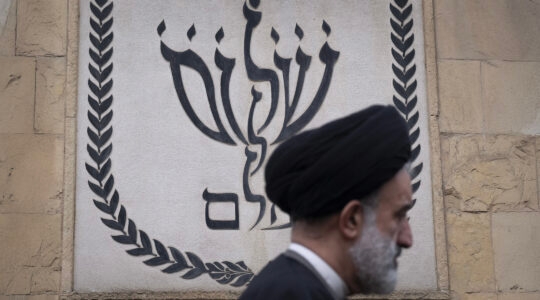NEW YORK (JTA) — Venezuelan Jews historically have enjoyed positive relations with the Venezuelan government. It is precisely because of the embracing nature of Venezuelan society toward the Jewish people that the recent anti-Semitism cloaked in anti-Israel and anti-Zionist terms is so disturbing.
Jews for hundreds of years have lived in Venezuela, which once served as a safe haven for Holocaust survivors and still is home to a significant Jewish community. So it is troubling that the leadership of the Latin American country has taken a wrong turn into fostering hatred, prejudice and bigotry against Jews and supports countries and terrorist groups that call for Israel’s destruction.
The Venezuelan leadership must realize that its demonization of Israel has given anti-Semites in Venezuela the opportunity to use the Jewish community as a proxy of Israel.
President Hugo Chavez’s decision to expel Israel’s representatives, and his approval of and support for Hamas and its Iranian backers, are dangerous signals that officials in his regime question Israel’s right to exist and stand with those who systematically engage in hatred and violent terrorism against the Jewish people.
Until very recently, Venezuela-Israel relations were strong. Venezuela voted in favor of Israel’s U.N. membership and the two countries enjoyed diplomatic ties. In 1975, when the United Nations passed its infamous “Zionism is racism" resolution, Venezuela stood up for Israel and abstained.
Israel has always worked to strengthen those ties. In 1995, when Shimon Peres was foreign minister, he visited Caracas during the second Rafael Caldera administration to "cement ties with friendly countries, and to deepen cooperation in areas of mutual benefit." Venezuela’s foreign minister at the time noted that "the reception that was given for Foreign Minister Peres was unprecedented."
Those warm ties have changed.
Under Chavez, Venezuela has formed alliances with extremist leaders in the Middle East, including Iranian President Mahmoud Ahmadinejad and Hezbollah Secretary-General Hassan Nasrallah. Chavez has supported openly terrorist groups, such as Hamas and Hezbollah, and referred to Ahmadinejad, who calls for Israel’s destruction, as “my brother.” In January, Venezuela severed diplomatic relations with Israel.
Attempts to distinguish Venezuela’s policies vis-a-vis Israel from its relationship with Jews ring hollow. This is especially so in the face of statements by Venezuelan government spokespeople and official media, which routinely cross the line of legitimate criticism of Israel into outright anti-Semitism.
Chavez’s angry condemnation of Israel in reaction to the most recent conflict in Gaza, and his call for the Venezuelan Jewish community to join in that condemnation, unleashed an unprecedented and scary outpouring of anti-Semitism. Anti-Semitic graffiti appeared on the walls of synagogues, Jewish-owned businesses and city plazas, Nazi imagery was used in anti-Israel rallies, and appeals were made to boycott Jewish-owned and Israeli businesses.
The government took inappropriate action when it issued a series of inflammatory statements, very publicly expelled the Israeli ambassador to Venezuela and other Israeli diplomats, and ended diplomatic relations with Israel.
Following Chavez’s actions and statements, members of parliament and media commentators unleashed a barrage of anti-Israel and anti-Jewish comments, and dozens of rallies featured anti-Israel expressions commingled with unbridled anti-Semitism.
As much as we welcome the renewed willingness of the Venezuelan government to reach out to its Jewish citizens and to denounce anti-Semitism, it is disingenuous for the government to continue to engage in Israel bashing knowing that the Venezuelan Jewish community will suffer as a result.
We appreciate that the government brought to justice those responsible for the attack on Tiferet Israel synagogue. However, much is left to do to restore the confidence of Venezuela’s Jews that the government will take the necessary steps to eliminate the atmosphere of permissiveness that has allowed an explosion of anti-Jewish sentiment and anti-Semitic hate crimes.
In April, the Palestinian Authority will open a diplomatic office in Caracas. Given Israeli diplomatic expulsion, thes move conveys the message that Venezuela has a one-sided policy toward the Israeli-Palestinian conflict, and it is another stop toward importing that conflict to Venezuela.
If the Venezuelan government would like to show a genuine desire to embrace democratic values of tolerance and respect, it should consider re-establishing relations with Israel and welcome back its ambassador and diplomats. It would send a signal to the world that Venezuela embraces all nations, including the Jewish state of Israel.
(Abraham Foxman is the national director of the Anti-Defamation League.)
JTA has documented Jewish history in real-time for over a century. Keep our journalism strong by joining us in supporting independent, award-winning reporting.





